Share

Forest Invest
Family Office Sentiments on Forest Investment with Gabriela Leslie
Join me today as I speak with Gabriela Leslie, Senior Manager, Food, Agriculture and Natural Capital at the Creo Syndicate - a membership organization that supports its family office members to better understand the latest developments in climate investing. It creates a platform for private family investors to come together, learn from each other and collaborate on investment opportunities to solve the climate crisis. In this illuminating conversation, we dig deep on how family offices are different than institutional investors and how this shapes why they consider forest investment, how they evaluate opportunities and what is challenging the attractiveness of forest investments currently (but the outlook is positive).
“So, we find that there’s a decision-making process that comes in around, not only is this a good investment and can this scale, but you know, is the impact really meaningful?”
Host: Shauna Matkovich - The Forest Link
Producer: Magdalena Laas - https://www.linkedin.com/in/laasmagdalena/
01:25
An overview of the Creo Syndicate
02:49
The profile of family office investors compared to institutional investors
06:21
Family office capacity to evaluate forest investments
08:29
Change in family office sentiment around investing in nature and why it is attractive
12:25
Sentiments on forests versus other natural climate investment strategies
16:15
The role of carbon markets
16:58
What makes forest investment strategies challenging at the moment
19:35
Exploratory and catalytic capital into forestry
21:47
Need for more transparency in forest investment
23:52
Emerging emphasis on biodiversity
26:18
Family office approach to catalytic finance
31:42
Investment vehicles suitable for family offices
35:55
Actionable advice for forest investment managers to attract more family office capital
37:27
Links (see below)
Significant quotes:[04:41] the lack of firepower means there’s a greater premium on capital efficiency and impact.
[05:12] So we find that there’s a decision-making process that comes in around, not only is this a good investment and can this scale, but you know, is the impact really meaningful?
[08:21] Our members come to the nature space with a lot of enthusiasm. I’d say this is a market shift over the last few years. We previously had folks come to us interested in nature but not really ready to engage [...] there’s more literacy around financial markets intersecting with nature now that there ever has been.
[22:23] I think some transparency around that counterfactual piece (Improved Forest Management) would be really important in helping uplift the reputation o the sector as an impact strategy.
[27:52] So catalytic in our mind doesn’t need to be philanthropic. It just needs to be risk on, it needs to be impact first. And we see some really great examples of folks coming in and they’ll either cut the first cheque or they be the last.
Links mentioned:Creo Syndicate: https://www.creosyndicate.org/
Sound Library:- Nature by MaxKoMusic/Soundcloud
- Sopwell Woodlands and Scohaboy Bog SAC, Cloughjordan, Co Tipperary, IRELAND by wild_rumpus/Soundcloud
Sign up now for the ForestLink’s newsletter, where you’ll receive technical advice, reflections, and best-practice guidance to support you with your forest-linked investment strategy or business straight to your inbox.
More episodes
View all episodes
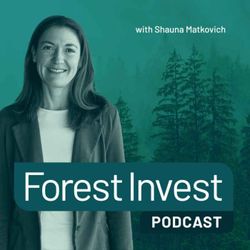
74. Geopolitics, Nature Markets, and the Future of Sustainable Forestry — with Ross Hampton
50:33||Season 3, Ep. 74The ForestLink newsletter signupISFCToday, I’m joined by Ross Hampton, CEO of the International Sustainable Forestry Coalition (ISFC). In this conversation, Ross shares what he’s hearing from forest businesses and institutional capital as geopolitical volatility collides with the accelerating push toward a circular bioeconomy. We unpack why nature and climate are now inseparable on the global stage, what COP-level discussions are signaling for forestry, and why “a thousand flowers blooming” in biodiversity schemes is hindering a scalable market. Ross also walks through ISFC’s work with TNFD and the Capitals Coalition to standardize ecosystem services measurement—laying groundwork for investable nature markets—and offers practical advice for governments who have an important enabling role, and investors who want to be early movers in natural capital.“Philanthropy plays a role, governments play a role, concessional finance plays a role — but these are minuscule compared to the scale of the challenge. The only real answer is the markets. It’s the $250 trillion sitting in pension, insurance and superannuation funds that is looking for a good return and increasingly wants to be nature and climate smart.” 1:29 – Ross’ background: politics/journalism → forestry, and why ISFC was created 2:35 – ISFC scope: member footprint, countries covered, and why scale matters 3:15 – Who ISFC represents: ownership structures across regions (investors, REITs, trading houses, integrated firms, quasi-government agencies) 4:47 – ISFC mission: accelerating a climate- and nature-smart circular bioeconomy 6:02 – The policy–finance disconnect: why capital isn’t linking to on-the-ground forestry needs 7:31 – The four funding streams (philanthropy, government, concessional finance, markets) and why markets are the only scalable answer 9:24 – Setting the stage: geopolitics and its impact on forest business/investment 10:09 – Global signals from recent events: COP momentum and “climate + nature” convergence 12:20 – The big project: working with TNFD + Capitals Coalition to measure ecosystem services 13:46 – “A gazillion initiatives” problem: why fragmentation prevents real markets 15:37 – What the project aims to prove: consistent measurement across global forest estates (7 ecosystem services) 17:09 – Timeline and milestones: outputs aimed for COP 17 (Armenia) and COP 31 (Turkey) 18:24 – Member sentiment (within limits): timberlands as a long-game, “stable island” asset class 22:08 – Whole-forest value vs “back to basics”: why the shift beyond timber isn’t slowing 23:41 – The “diamond in the rough”: externalising ecosystem services to unlock restoration at scale 26:02 – Policy fragmentation: why nature markets don’t scale when governments go it alone 27:08 – The hardest leap: paying for what used to be “free” (nature services) 28:51 – Shadow pricing: nature value already showing up in estate pricing above stump value 31:02 – Beyond measurement: enabling conditions governments must create (tech, incentives, stacking) 33:43 – A counterintuitive principle: don’t only pay for “uplift” (avoid penalising good stewards) 39:13 – Global South vs Global North: differing contexts, shared opportunity, where growth may happen 43:38 – Where policy conversations get stuck: finance vs industry vs forestry/agriculture vs environment 45:29 – Davos/WEF touchpoint: reception and momentum 45:42 – Crystal ball: what’s next, and key 2026 moments (Japan, Climate Week NYC, COPs) 48:10 – One actionable takeaway for new investors: lean into natural capital and nature markets early 49:39 – Where to learn more: ISFC website + natural capital reportFounding Director and Host: Shauna Matkovich - The ForestLinkProducer and Editor: Magdalena Laas - Unscripted CreativesNature by MaxKoMusic/SoundcloudSopwell Woodlands and Scohaboy Bog SAC, Cloughjordan, Co Tipperary, IRELAND by wild_rumpus/SoundcloudAmbient Documentary by Sound Guru (Pixabay)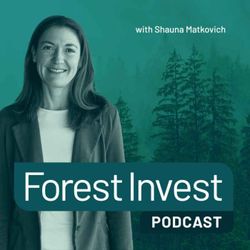
73. From the vault: Sustainable Forest Management in Production Forests – with Marcos Wichert
39:07||Season 3, Ep. 73The ForestLink newsletter signupMarcos on LinkedInIndicators - Biodiversity | Stora EnsoBiodiversity indicators for plantations - Biodiversity | Stora EnsoSpecies Threat Abatement and Restoration (STAR) metricInvestor News: Stora Enso partners with IUCN to advance positive impacts on biodiversityFrom the vault 🎙️In this rerun, Marcos Wichert, Vice President of Plantation Forest and Sustainability Management at Stora Enso, shares lessons from his global career across Brazil, China, New Zealand, and Finland. We explore how sustainable forestry must adapt to local ecosystems, regulations, and communities, from catchment-based planning and biodiversity KPIs to the realities of Eucalyptus. A practical, boardroom-level conversation on aligning forestry investments with climate, nature, and long-term value.“Sustainable forestry means managing commercial forests at a landscape level, with the catchment area as the key management unit to monitor and guide the impacts of forestry activities.”Harvest less than the forest grows each year, and that’s a basic principle of sustainable forestry."0:00 From the vault: sustainable forest management in production forestry0:40 Navigating ecosystem services, standards, and new tools in forest finance1:13 Marcos Wichert joins + “favourite tree” icebreaker (Araucaria angustifolia)1:44 Marcos’ career journey: Brazil → China → New Zealand → Brazil → Indonesia → Finland4:29 Defining sustainable forestry: core principles + landscape-level responsibility5:15 Catchment-based planning and hydrology as a sustainability foundation6:13 How sustainability differs by jurisdiction: Brazil vs China vs the Nordics10:07 Plantation vs semi-natural forests, certification realities, and investor considerations12:50 What investors should assess: FSC/PEFC, KPIs, monitoring, and traceable data16:15 Eucalyptus: myths, risks, and best practice (right species, right place)18:03 Water stability through age-class mosaics across a catchment22:14 Spatial vs temporal scales: compartments, estates, landscapes, and planning units24:01 EU Deforestation Regulation (EUDR): traceability down to compartment level25:15 Why catchments matter for sustainability (especially for fast-growing species)29:08 Boardroom sustainability: clients, regulation, traceability, and “nature-positive” products31:11 The premium problem: paying for biodiversity and beyond-compliance actions32:30 Nature Positive Impact (NPI): targets, science partnerships, and biodiversity KPIs34:24 Public equities: what to look for in sustainability reporting + red flags37:06 Wrap-up: forestry’s role in climate + biodiversity solutions38:02 Where to find Marcos: LinkedIn + EUFRO work on automation and robotics38:51 Closing from Shauna Matkovich (Forest Invest)Founding Director and Host: Shauna Matkovich - The ForestLinkProducer and Editor: Magdalena Laas - Unscripted CreativesNature by MaxKoMusic/SoundcloudSopwell Woodlands and Scohaboy Bog SAC, Cloughjordan, Co Tipperary, IRELAND by wild_rumpus/SoundcloudAmbient Documentary by Sound Guru (Pixabay)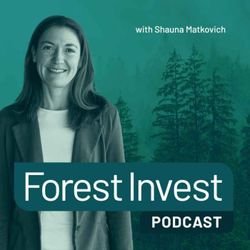
72. US Southeast Timberland Markets in Transition — A University Perspective with Erin Lincoln
40:17||Season 3, Ep. 72The ForestLink newsletter sign-upHarley Langdale Jr. Center for Forest BusinessToday, I’m joined by Erin Lincoln, Director of the Harley Langdale Jr. Center for Forest Business at the University of Georgia, for an academic, data-driven look at what’s happening across timberland markets in the U.S. Southeast. Erin breaks down how hurricane impacts, permanent pulp and paper mill closures, and soft housing starts are reshaping demand for small-diameter wood—and what that means for landowners, communities, and investors. We explore where opportunity may emerge next, from bioenergy, carbon capture and storage, biochar, sustainable aviation fuel and natural capital themes, alongside the growing role of higher-and-better-use (HBU) revenue streams. Erin also explains how investor expectations differ across the U.S., Europe, and Asia, why reporting requirements are pinching TIMOs, and where AI could unlock new efficiency across forestry operations, compliance, and decision-making.Forestry is extremely data intensive, and AI has the potential to fundamentally change how we manage forests—from thinning decisions to trucking efficiency and compliance.00:00 Welcome to Forest Invest00:32 Erin Lincoln’s favorite tree (and why oaks matter)01:02 Erin’s career path and role at the Center for Forest Business02:10 Education, outreach, and research at UGA03:19 Why the program is known for forest finance and economics04:48 Setting the scene: the state of the US forest industry05:00 Mill closures in the Southeast and hurricane impacts07:12 Housing starts, inflation, and pressure on sawmills08:04 Declining paper demand and global competition09:09 Permanent mill closures and real estate constraints10:05 Downturns create opportunity: bioenergy, biochar, SAF11:39 Public perception of forestry and sustainable harvesting14:43 What investors should know right now14:56 Real estate, HBUs, and diversified revenue streams16:16 ESG, natural capital, and return expectations17:24 US vs European investor priorities18:41 Reporting burdens and pressure on TMOs20:06 Specialisation in a maturing timber investment market22:01 What future forest investment professionals care about23:52 Generational shifts in forestry careers25:56 Research priorities: natural capital and bioeconomy27:42 Measuring the full economic impact of forestry28:42 Key knowledge gaps in carbon and forest products30:04 The role of investors in shaping innovation31:04 Advice for young foresters choosing a specialty32:34 Why Erin is optimistic about the sector’s future33:31 Artificial intelligence in forestry and timber investment36:32 Where AI is already improving efficiency38:08 One actionable piece of advice for new investors39:18 Where to learn more about the Center for Forest Business40:01 Closing remarksProduction teamFounding Director and Host: Shauna Matkovich - The ForestLinkProducer and Editor: Magdalena Laas - Unscripted CreativesSound libraryNature by MaxKoMusic/SoundcloudSopwell Woodlands and Scohaboy Bog SAC, Cloughjordan, Co Tipperary, IRELAND by wild_rumpus/Soundcloud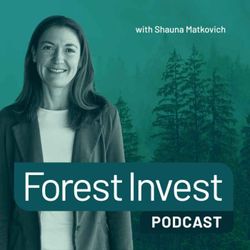
71. Conserving US Working Forests with Mission-First Capital - with Matt Purdy
47:31||Season 3, Ep. 71The ForestLink newsletter sign-upThe Conservation FundToday, I’m joined by Matt Purdy, Director of Forest Investments at The Conservation Fund, a national nonprofit focused on conserving land in the U.S. while strengthening local communities and economies. In this conversation, Matt explains how their Working Forest Fund protects large, productive forests in perpetuity by taking conversion off the table—often through conservation easements designed specifically for sustainable timber management. We unpack how The Conservation Fund acts as a bridge owner for public agencies and land trusts, what their capital stack looks like (including low-cost debt and a green bond), and why they always underwrite multiple pathways to a conservation outcome. We also dig into how carbon projects fit into their model, including their first issuance under ACR’s IFM 2.1 “removals-only” methodology, and the trade-offs of financing conservation without “turning off the saws.” Finally, Matt shares what’s changing in private capital—from mission-aligned family offices to corporate partners like Apple, and why mill closures remain one of the biggest risks to working forests and forest-based livelihoods. Most investors look at conservation easements after they’ve exhausted every other revenue source. For us, the conservation easement is the first thing we underwrite.”“We’re very aware that turning off the saws can hurt communities. Our goal is to balance carbon projects with continued harvesting so forests remain working forests.”00:00 Welcome to Forest Invest00:31 Matt Purdy’s favourite tree and personal background01:19 From timber cruiser to Director of Forest Investments02:27 What is The Conservation Fund and its dual mission03:52 What does “working forest” really mean?05:39 Conservation easements and permanent forest protection06:09 The bridge-ownership model explained09:06 Managing risk with multiple conservation exit paths10:09 Capital stack, low-cost debt, and green bonds11:25 Two conservation pathways: public ownership vs private resale12:30 How The Conservation Fund compares to other nonprofits14:16 NGOs vs TIMOs: mission-first vs return-first investing17:43 Plantation forests, natural forests, and partner priorities18:58 Conservation easements as an investment tool20:03 Carbon projects and Improved Forest Management (IFM)21:00 Balancing harvests, carbon, and community livelihoods23:24 ACR IFM 2.1 and removals-only carbon credits24:20 Inside their first IFM 2.1 project27:04 Working with private capital and mission-aligned investors29:30 The Apple co-ownership deal explained32:18 Corporates vs institutional investors: key differences35:35 Opportunities and challenges for conservation ownership41:07 Mill closures and risks to forest-based livelihoods43:10 What’s next for The Conservation Fund44:41 One piece of advice for new forest investors46:57 Where to learn more and closing remarksProduction teamFounding Director and Host: Shauna Matkovich - The ForestLinkProducer and Editor: Magdalena Laas - Unscripted CreativesSound libraryNature by MaxKoMusic/SoundcloudSopwell Woodlands and Scohaboy Bog SAC, Cloughjordan, Co Tipperary, IRELAND by wild_rumpus/Soundcloud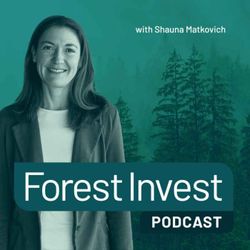
70. 10 most downloaded episodes
33:22||Season 3, Ep. 70https://theforestlink.com/podcast/Quarlbo BiodiversityXilvaGresham HouseNew ForestsSFMAborcrest InvestmentsAarden AICE Events and MediaMEAGBTG Pactual Timberland Investment GroupIn this special start-of-year episode, Forest Invest looks back at the 10 most downloaded conversations of all time and distills the most powerful insights from global leaders in forest finance, natural capital, biodiversity markets, and climate-positive investing.From biodiversity credits and due diligence frameworks to timberland strategy, land use optimisation, and the future of nature-based investments, this episode brings together the ideas that resonated most with listeners and continue to shape the sector.If you’re investing in forests, natural capital, or climate solutions in 2026, this is your essential recap and inspiration to start the year informed and motivated.00:00 Welcome to Forest Invest & Season 300:45 Why this episode: Top 10 most downloaded insights01:10 #1 Biodiversity credits explained: conservation, restoration & diversified forest management03:05 #2 Due diligence in forest investment: impact, risk, and scalability08:34 #3 Long-rotation forestry, climate risk, and timber demand11:40 #4 Open-ended forestry funds and long-term stewardship14:01 #5 Scaling plantations through landowner partnerships18:13 #6 Why forestry is misunderstood as an asset class21:39 #7 Breaking silos in land-use and investment decision-making24:45 #8 The disconnect between biodiversity supply and demand28:56 #9 How natural capital fits into institutional portfolios30:46 #10 Land sparing, conservation design, and nature-positive outcomes32:48 Key takeaways from the top 10 episodes33:06 Invest in forests & closing remarksProduction teamFounding Director and Host: Shauna Matkovich - The ForestLinkProducer and Editor: Magdalena Laas - Unscripted CreativesSound libraryNature by MaxKoMusic/SoundcloudSopwell Woodlands and Scohaboy Bog SAC, Cloughjordan, Co Tipperary, IRELAND by wild_rumpus/Soundcloud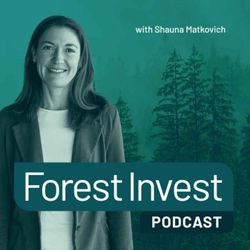
69. Returns from Restoring the Forest Soil Microbiome – with Josh Parrish of Funga
44:52||Season 2, Ep. 69The ForestLink newsletter sign-upFungaJosh Parrish (LinkedIn)Today, I’m joined by Josh Parrish, Chief Growth Officer at Funga.Josh explains how restoring the forest soil microbiome with native mycorrhizal fungi can meaningfully improve tree survival and boost growth rates in intensively managed Southern pine plantations, without relying on synthetic inputs.We explore the science and technology behind Funga’s approach, including DNA sequencing, machine learning analysis of fungal communities, nursery inoculation methods, and large-scale field trials across 12 US states. Josh also explains why degraded below-ground biodiversity is one of the most overlooked risks in modern forestry and long-term forest investment.Josh shares early evidence showing up to 30 percent gains in productivity, outlines Funga’s carbon removal business model, and describes how their 30-year lease structure works for landowners. We end with a discussion about what high-profile carbon removal buyers such as Netflix may signal for the future of regenerative forestry and nature-based climate solutions.After a harvest, we see about a 75% reduction in below-ground biodiversity in these pine systems" ... “What we’re targeting—and seeing—is approximately a 30% lift in productivity over time from restoring the microbiome. Chapters00:00] Intro and welcome [00:19] Meet Josh Parrish, Chief Growth Officer at Funga [00:32] Favourite tree: the white oak [02:01] Josh’s background and journey to Funga [04:16] What is the forest soil microbiome? [04:42] Mycorrhizal fungi explained [07:11] Why below-ground biodiversity matters [08:22] Why nobody talks about soil health [09:48] Technology behind Funga’s approach [11:00] What happens to forest soils after harvest [14:14] Risks of a degraded microbiome [16:19] How landowners can assess soil health [17:25] How Funga inoculates seedlings [18:25] The nursery partnership and process [21:10] How prescriptions for inoculation are created [23:11] How to identify inoculated roots [24:02] Control vs. inoculated seedlings [27:00] Early results and productivity gains [29:45] Restoration vs synthetic inputs [30:19] Funga’s business model [31:56] The 30-year carbon lease [33:02] Carbon methodology and enhanced sequestration [37:02] Partnership with Netflix [40:02] Scaling awareness with landowners [41:32] What’s next for Funga [43:31] Advice for new forest investors [44:36] ClosingProduction teamFounding Director and Host: Shauna Matkovich - The ForestLinkProducer and Editor: Magdalena Laas - Unscripted CreativesSound libraryNature by MaxKoMusic/SoundcloudSopwell Woodlands and Scohaboy Bog SAC, Cloughjordan, Co Tipperary, IRELAND by wild_rumpus/Soundcloud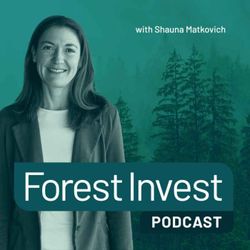
68. Development Finance for Emerging Market Forestry – with Anton Timpers of FMO
38:50||Season 2, Ep. 68The ForestLink newsletter sign-upAnton Timpers (LinkedIn)FMOToday on Forest Invest, I am joined by Anton Timpers, Manager of Agriculture, Food and Forestry at FMO, the Dutch entrepreneurial development bank.Anton explains how FMO approaches forestry as part of its wider agribusiness and sustainable land-use strategy. We discuss how the bank invests across the full forestry life cycle, from early-stage plantation projects to mature industrial forestry in emerging markets. Anton also outlines why FMO continues to support sustainable plantation forestry as a cornerstone of the future bio-based economy.We explore the role of blended finance and concessional capital in crowding in private investment, and how development finance institutions can help reduce risk in frontier and emerging markets. Anton highlights the environmental and social safeguards FMO applies to avoid deforestation, ensure certification, and prevent greenwashing in forestry projects.Anton also shares FMO’s ambition to invest up to 1 billion euros in forestry and sustainable land use by 2030. We talk about the challenge of finding truly bankable forestry projects in fragmented markets across Latin America, Africa and Asia, and what potential investees need to have in place before approaching a development finance institution like FMO.We are convinced about the opportunities in emerging markets, and we hope that with global supply shifting, people will consider these locations more seriously. Chapters [00:23] Meet today’s guest: Anton Timpers (FMO) [00:34] Favourite tree [01:02] Anton’s background and intro to FMO [02:05] Building FMO’s forestry focus [02:33] What makes FMO’s approach unique [03:58] Investing across the asset maturity spectrum [04:45] Co-investors and partners [06:03] Appetite from commercial investors [06:32] Plantation forestry vs natural forests [08:20] Conservation, restoration and carbon risks [10:13] Safeguards, certification and due diligence [11:29] Why forestry moved into the agri team [13:04] Standards, safeguards and risk frameworks [14:26] FMO’s €1 billion forestry goal [15:53] Main obstacles and fragmented markets [17:49] Industrial demand and medium-sized enterprises [20:01] Illegal logging and market realities [21:47] Small global community of forestry investors [23:21] What potential investees should know [25:14] What to prepare before approaching FMO [27:07] Direct equity vs fund-led co-investments [27:50] COP discussions, pledges and Brazil focus [29:39] Carbon credits, accounting and market gaps [31:03] Positive momentum from COP [32:06] Geographic focus: LatAm, Africa, Asia [33:29] Concessional capital and early-stage funding [35:36] How to approach FMO with an opportunity [36:00] Final reflections [36:11] Actionable advice for first-time forest investorsProduction teamFounding Director and Host: Shauna Matkovich - The ForestLinkProducer and Editor: Magdalena Laas - Unscripted Creatives Nature by MaxKoMusic/SoundcloudSopwell Woodlands and Scohaboy Bog SAC, Cloughjordan, Co Tipperary, IRELAND by wild_rumpus/Soundcloud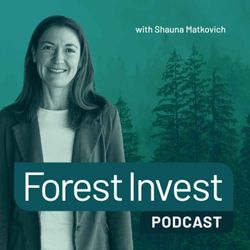
67. A Social Impact NZ Forest Carbon Investment Model – with Blair Jamieson
51:01||Season 2, Ep. 67The ForestLink newsletter signupTāmata HauhāBlair Jamieson on LinkedInWe’ve proven that it works — that you can invest in Māori land, generate real returns, and create meaningful change.In today’s episode, I’m joined by Blair Jamieson, CEO and Co-Founder of Tāmata Hauhā, a New Zealand–based company leading the way in Māori land investment, carbon forestry, and sustainable land-use transformation. Blair shares how his background in government shaped the creation of this mission-driven organisation, which helps Indigenous Māori landowners unlock economic opportunities by developing under-utilised land into long-term, intergenerational assets that generate both social impact and financial returns.We explore the realities and complexities of Māori land ownership and why building trust requires what Blair calls a “thousand cups of tea” approach — patient, relationship-centred engagement grounded in cultural respect. Blair explains how Tāmata Hauhā blends cultural integrity with commercial pragmatism, collaborating with more than 70 Indigenous groups to establish forests that deliver economic, community, climate, and biodiversity benefits.Blair also breaks down New Zealand’s Emissions Trading Scheme (NZ ETS), offering rare insights into how this compliance-based carbon market provides credibility, transparency, and liquidity unmatched by most voluntary carbon systems. We discuss the company’s investment model, expected returns, and its expansion into the Chatham Islands, where carbon forestry is reshaping remote communities and supporting nature-based climate solutions.Chapters00:00 – Welcome & Introduction00:23 – Meet Blair Jamieson & Tāmata Hauhā01:21 – What the Company Does02:25 – Blair’s Background in Government03:17 – Forestry as an Economic Enabler for Māori Land04:12 – Working with 70+ Indigenous Groups05:05 – Community Impact & Commercial Returns06:11 – Māori Land Ownership Explained09:39 – The “Thousand Cups of Tea” Approach12:39 – Māori Leadership Within the Company14:29 – History of Radiata & NZ Forestry17:35 – Moving Beyond Pine Monoculture20:06 – Nurse Crops & Native Regeneration22:27 – NZ Emissions Trading Scheme (ETS) Overview24:30 – How NZU Compliance Markets Work31:51 – Carbon Prices & Market Dynamics33:38 – Investment Model Explained35:26 – Chatham Islands Projects39:35 – Māori vs Moriori: Cultural Context41:48 – Main Risks: Politics, Not Integrity45:12 – What’s Next for Tāmata Hauhā47:17 – Scaling & International Interest47:51 – Final Advice for New Forestry InvestorsProduction teamFounding Director and Host: Shauna Matkovich - The ForestLinkProducer and Editor: Magdalena Laas - Unscripted CreativesSound libraryNature by MaxKoMusic/SoundcloudSopwell Woodlands and Scohaboy Bog SAC, Cloughjordan, Co Tipperary, IRELAND by wild_rumpus/Soundcloud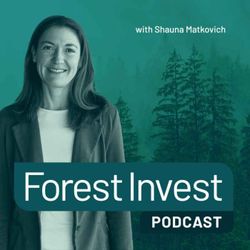
66. Restoring the Andes: Global Lessons from Ancient Wisdom – with Florent Kaiser
57:32||Season 2, Ep. 66The ForestLink newsletter signupGlobal Forest GenerationAcción AndinaFlorent Kaiser (LinkedIn)Earthshot PrizeIn this episode, I’m joined by Florent Kaiser, CEO of Global Forest Generation and co-lead of Acción Andina, winner of the 2023 Earthshot Prize. Florent shares how a grassroots movement born in the Peruvian Andes has evolved into a six-country restoration effort—reviving the world’s highest forests by combining Indigenous principles of Ayni (reciprocity) and Minka (collective service) with modern science, technology, and climate finance.We explore what authentic community engagement looks like in practice, how to balance trust and expectations in long-term partnerships, and why forest restoration must begin by listening—to people, to landscapes, and to water.Florent also outlines the next phase of Acción Andina’s mission: linking forest restoration and water security to attract new forms of capital, and inviting investors to build relationships rooted in dignity, co-ownership, and respect.Seeing tens of thousands of people planting trees together isn’t just ecological restoration — it’s an act of hope. It reminds us that working with nature unites us beyond economics or politics.Chapters[00:00] Welcome & introduction – Shauna Matkovich and Florent Kaiser (Global Forest Generation / Acción Andina) [01:00] From childhood curiosity to creating a global forest movement [03:00] Founding Acción Andina and Global Forest Generation [07:30] How Indigenous principles of Ayni and Minka guide restoration [12:30] What real community leadership and engagement look like [17:00] Winning the Earthshot Prize and what it means for restoration [21:30] Building trust and managing expectations with local partners [33:00] Linking forest restoration with water security and long-term finance [49:00] Blending ancient wisdom with modern tools and innovation [54:00] Advice for investors: visit, listen, and invest in relationshipsProduction teamFounding Director and Host: Shauna Matkovich - The ForestLinkProducer and Editor: Magdalena Laas - Unscripted CreativesSound libraryNature by MaxKoMusic/SoundcloudSopwell Woodlands and Scohaboy Bog SAC, Cloughjordan, Co Tipperary, IRELAND by wild_rumpus/Soundcloud